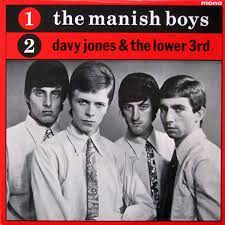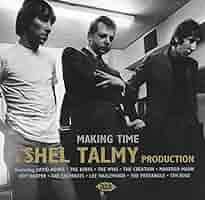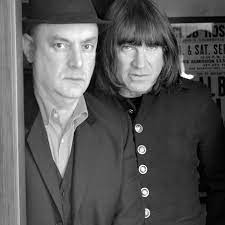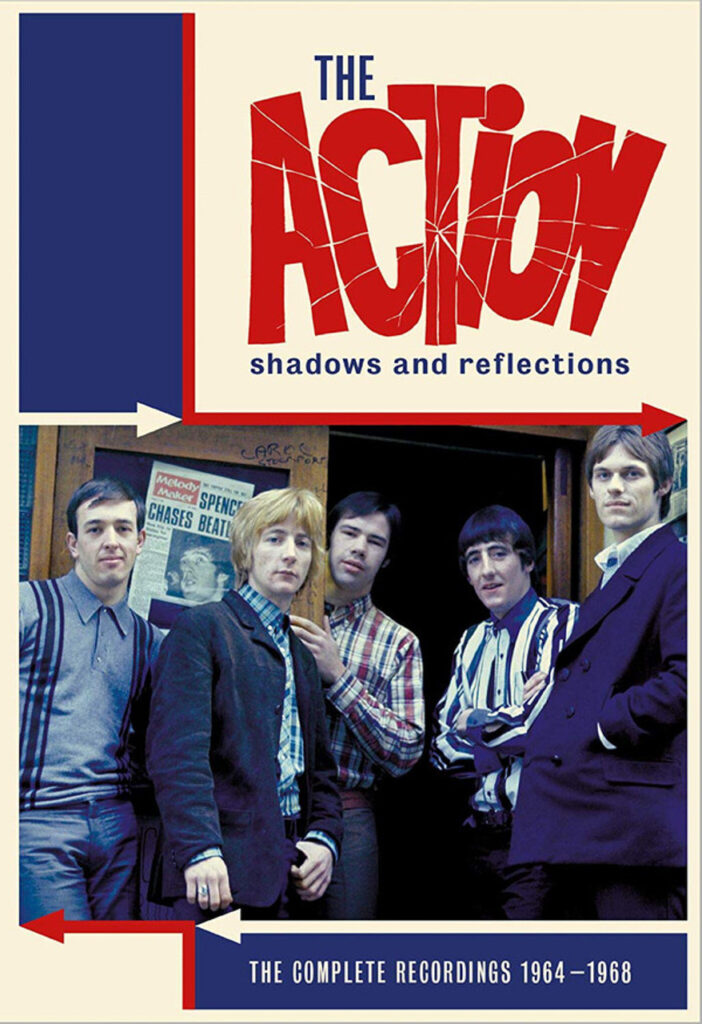Although this story was commissioned and written a few years before I posted this on my blog in 2023, it didn’t run at the time. Here it’s presented for the first time, with some updated information.
A few years ago, El Cerrito, California rock archivist Alec Palao was visiting Shel Talmy, producer of classic early hits by the Who, the Kinks, and others. “After I inquired as to whether he had any copies of his old records, his wife mentioned, ‘There are some here in the closet,’” Palao remembers. “I pulled out a blank acetate and it said ‘Davy Jones’ on it. Naturally, I was very, very excited.”
This wasn’t the Davy Jones who sang in the Monkees. Before he changed his name to David Bowie in the mid-’60s, a young British mod named David Jones cut several flop singles in London—including a couple produced by Talmy. “I got home and played it, lo and behold, there’s five completely unknown, undocumented David Bowie songs,” enthuses Alec. “Subsequently I found another four, looking through the rest of his archive. To come across fresh Bowie—and for it to be really great garage-y, the most snotty, punky Bowie you’ll ever hear—was really exciting.”

It wasn’t exactly another day on the job for Palao, even after a quarter century of digging up buried treasure from a mountain of ‘60s garage rock, psychedelic, British Invasion, and soul performers from around the globe. And there was more where that came from, as the US-born Talmy (now back in California) produced a wealth of great hits and misses in ‘60s London, including the decade’s best Australian rockers, the Easybeats; boundary-stretching folk-rockers Roy Harper and Pentangle; and cult mods the Creation, who like the Who pioneered the use of feedback and innovative guitar distortion. “He had unreleased stuff by all the major artists he worked with,” marvels Palao.
Some of the first fruits of those finds are on the Palao-assembled Ace Records compilation Making Time: A Shel Talmy Production, including a different version of Davy Jones/Bowie’s third single, “You’ve Got a Habit of Leaving.” It features one of the most shuddering, noise-ridden mid-’60s guitar solos this side of Pete Townshend. Other unissued Talmy productions are also starting to see the light of day via Palao, like an entire unreleased mid-’60s LP by folk guitar virtuoso Jon-Mark that neither Alec nor anyone else knew existed. These are just the latest projects in a career that’s seen him assemble and write liner notes for hundreds of reissues, largely though not exclusively of artists from the ‘60s, from superstars to obscure cult acts that never got to issue an album.

Born and raised in London, but a resident of the East Bay for over three decades, Palao knows it takes more than blind luck to stumble upon closets full of such riches. “I started off being a consumer and fan myself,” he explains while juggling the tapes, discs, and sound files from his usual multitude of simultaneous projects in his El Cerrito home office, a couple miles or so north of Berkeley. “I had started working in retail selling reissues, in my case with mail order. I did that for many years, until I began to realize I’d rather create records than sell them.”
A la producers from the early days of the music business who’d travel to or set up shop in New Orleans, Texas, or New Mexico to record musicians, “I frequently would travel around the country, often with a tape machine in the back of the car, which I found was the best way to gain access to off-limit catalogs. A great example is Frank Werber, who managed the Kingston Trio. I spoke to him on the phone a few times, and he was a little bit circumspect at first. But we got to know each other, and finally he said, ‘Well, come on down.’
“So my wife Cindy and I loaded up the car with tape machines, drove down to New Mexico, [and] set up next to the bank vault of the town’s old post office, which Frank owned. We opened it up, and there were all these master tapes. I knew he’d produced certain groups [for his Trident Productions company], like Sons of Champlin, Mystery Trend, Blackburn & Snow, so I was anxious to see that he’d kept that. But not only had he kept that, he had all these tapes by other people—Sly Stone, Quicksilver, the Grateful Dead, you name it. Because he’d owned a recording studio too.
“That was one of my earliest revelations—you’ve gotta get a hold of the guys that actually made this stuff, whether it be studios, producers, or label owners. Because they’re gonna have the real gold. No one told me to go and talk to Shel Talmy. I just went and visited him, and he revealed he still had a lot of his vintage material. So we started working together, and eventually he told me, ‘Have at it.’”
While Palao has worked on projects from musicians hailing from everywhere from Iceland to Uruguay, from major acts like The Zombies to esoterica the like of little-known early 70s songstress Laurie Styvers, he’s also retrieved a goldmine of ‘60s Bay Area rock from obscurity. Such notable acts as psychedelic pioneers the Charlatans, Frumious Bandersnatch, and unheralded folk-rock duo Blackburn & Snow, who barely eked out a single or two during their heydays (or, like all-women band Ace of Cups, didn’t manage to release anything at all), literally owe nearly their entire discographies to his rescue missions from their tape vaults. He oversaw expanded editions of Country Joe & the Fish’s first two albums, featuring his usual mini-book-length liner notes. He also compiled the definitive ‘60s San Francisco psychedelic box (Love Is But the Song We Sing: San Francisco Nuggets), and recently added another chapter to Rhino Records’ sporadic Nuggets series with another volume of overlooked ‘60s rock, the vinyl-only double album Transparent Days: West Coast Nuggets.

Divided into LP sides for folk rock, garage rock, pop-rock, and psychedelia, it’s unlikely anyone (except maybe Palao himself) has all thirty of the 1965-68 off-the-beaten tracks on Transparent Days in their original form. The Bay Area (the roaring Marin County garage rock on the Front Line’s “Got Love” is a highlight) is but the midpoint of a collection spanning Vancouver to San Diego. Even the relatively well known groups like Love and the Electric Prunes are represented by non-LP singles fans of those bands might have yet to come across, and hitmakers the Association by the downright bonkers psychedelic outing “Pandora’s Golden Heebie Jeebies.”
Observes Alec, “If you’re a fan of ‘60s pop, you’re familiar with ‘Cherish’ and ‘Never My Love.’ So if you see the name ‘the Association,’ you’re gonna assume it’s gonna be that sort of a sound. Instead you get this very existential piece of music with a koto, odd lyrics, and odd harmonies. So hopefully this will open ears.”
The first San Francisco group to successfully respond to the British Invasion is represented too, but it’s certain that no one would have heard Ron Elliott’s “Candlestickmaker” (later reworked on the title track of his 1970 solo album), as this October 1966 demo by the Beau Brummels’ lead guitarist and chief songwriter makes its first appearance on Transparent Days. It’s an example not only of Elliott’s idiosyncratically moody folk-rock, but also of how Palao uncovers gems by turning every stone he can.
“I came across it on a tape that was from the recording studio where it was done, [San Francisco’s] Golden State Recorders,” he says. “It wasn’t identified as the song ‘Candlestick Maker,’ or as Ron Elliott. But when I heard it, it’s like, ‘I think I know what this is.’ I sort of triangulated with memorabilia and paperwork that I have from the studio, and discovered that yes, Ron Elliott did a demo session in October 1966, and went and played it to him. He said, ‘Oh yeah…’”
Some legends even leave forgotten tapes at the recording studio, and they’d likely disintegrate if historians like Palao weren’t around to discover them. “Original Sound in Hollywood was what they call a ‘dark’ studio, non-union,” he says by way of illustration. “So people could go there and just experiment, and not have to worry about paying big union fees to musicians. A lot of publishers liked that. Plus [the recording equipment] was in a unique format, 10-track, so it was like [a] big deal. A lot of tapes were left there because there was only one machine that could play them, and that was at this studio. I found tapes by Carole King, Joni Mitchell, Lowell George, Mike Nesmith, Captain Beefheart—all these people would go there and record. It’s been a really magical stash to go through.”
A veteran musician of numerous bands (including the Sneetches and Sting-Rays) going back to the ‘80s, Palao’s also played in reunited versions of ‘60s groups like the Beau Brummels, Chocolate Watchband, and the Seeds, as well as currently pursuing his own muse in Strangers In A Strange Land. You sense he’ll never lack time, however, for more archival projects, like two large multi-disc sets he’s planning “to document performances done at the Avalon Ballroom and the Matrix Nightclub in the ‘60s. These are holy grail tapes. I knew about them many years ago, but it’s taken this long to finally be able to get the access to them. It’s an incredible history of how the San Francisco music scene evolved. It confirms some myths, and dispels a lot of others. There’s a lot of mediocre music as well as a lot of transcendental stuff”—not just by scene kingpins like Big Brother & the Holding Company and Quicksilver Messenger Service, but also superb lesser-knowns like the Great Society, whose singer was a pre-Jefferson Airplane Grace Slick.

Another project he’s particularly excited about working on is the new four-CD box set for RPM Records of the Action. The mid-‘60s British mod band were produced by George Martin, and have generated a large cult following with singles somewhat akin to a more soul-oriented spin on the sound of fellow mods like the Small Faces. However, they never landed a hit in their native UK, made no impression in the US at the time, and didn’t manage to release a LP before breaking up in the late 1960s.
Titled Shadows And Reflections: The Complete Recordings 1964-1968, Palao says it will prove to be the last word on this frequently-reissued cult act. In addition to their five Parlophone singles, it features BBC sessions, demos and audition material, and a whole disc of previously unissued stereo mixes and studio outtakes, culled from the band’s sessions with George Martin at Abbey Road. “That’s about as close as I’ll get to mixing the Beatles!” he laughs.

“A lot of people might ask me, ‘Aren’t you scraping the barrel?’ And I’ll always tell them, ‘No.’ I know there’s probably great unreleased albums by all manner of artists in all genres out there. You just gotta go do the hunting and sifting to find them.”